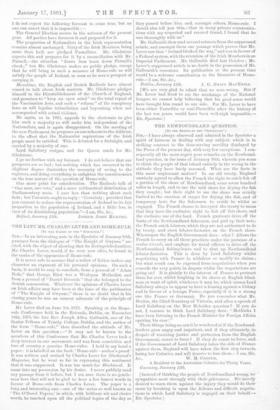THE NEWFOUNDLAND QUESTION.
[To THE EDITOR OF THE "J
SIE,—I have always observed and admired in the Spectator a spirit of fairness in dealing with any subject, which is in striking contrast to the time-serving servility displayed by the Press of the present day, with very few exceptions. I con- sequently all the more regret your remarks on the Newfound- land question, in the issue of January 10th, wherein you seem to think the people of that island entirely in the wrong in the attitude they have lately assumed. What are the facts in this most unpleasant matter P In an old treaty, England unwisely agreed to allow the French the right to catch fish off a portion of the shore of Newfoundland, some seven hundred miles in length, and to use the said shore for drying the fish they caught ; but their right to use the shore was strictly limited to the erection of stages for drying the fish, and of temporary huts for the fishermen to reside in whilst so engaged. The French choose to interpret the treaty to mean that they have the exclusive right to fish off this shore, and the exclusive use of the land. French gunboats drive off the boats of the Newfoundland fishermen, and pull up their nets; the French catch lobsters, which they are not authorised to do by treaty, and erect lobster-factories on the French shore. Whereupon the English Government does—what P Allows the French to carry on all these practices under the pretence of a modus vivendi, and employs its naval officers to drive off the Newfoundland fishing-boats and to shut up Newfoundland lobster-factories. This is done by Lord Salisbury whilst negotiating with France to withdraw or modify its claims ; but what result can be expected from negotiations when you concede the very points in dispute whilst the negotiations are going on? It is plainly to the interest of France to protract them for ever, whilst laughing in its sleeve at English blind- ness or want of spirit, whichever it may be, which causes Lord Salisbury always to appear to have a leaning against a Colony and in favour of a foreign Power, especially if it is a strong one like France or Germany. Do you remember what Mr. Deakin, the Chief Secretary of Victoria, said after a speech of Lord Salisbury on the New Hebrides question ? If you do not, I venture to think Lord Salisbury does : "Methinks I have been listening to the French Minister for Foreign Affairs opening his case I"
These things being so, can it be wondered at if the Newfound- landers grow angry and impatient, and if they ultimately, in despair of receiving justice and protection from the English Government, resort to force If they do resort to force, and if the Government of Lord Salisbury takes the side of France against them, England will have taken the first step towards losing her Colonies, and will deserve to lose them.—I am, Sir, A Resident in the Australian Colonies for Thirty Years. Guernsey, January 12th.
[Instead of thinking the people of Newfoundland wrong, we sympathise most strongly with their grievances. We merely desired to warn them against the injury they would do their cause by breaking in upon the delicate and difficult negotia•. tions in which Lord Salisbury is engaged on their behalf.--• ED. Spectator.]






































 Previous page
Previous page